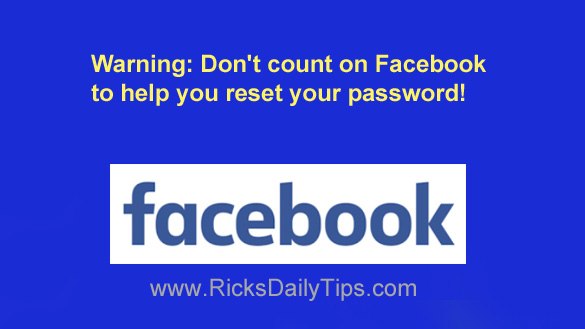 Have you ever had your Facebook account taken over by a hacker?
Have you ever had your Facebook account taken over by a hacker?
Or have you ever forgotten your Facebook password and had to use Facebook’s “Account Recovery” tools to get back into your account?
If so, you probably know just how difficult it can be to regain control of your own Facebook account once it has been hacked or you have forgotten your login info.
I receive several frantic requests for help every week from folks who’ve had their Facebook accounts hijacked or they forgot their passwords, and the sad thing is I’m unable to help them in many of those situations.
If a hacker breaks into your Facebook account and changes your login information or you forget your password and no longer have access to the email address or phone number you set the account up with, it can often be virtually impossible to regain access to your account.
The problem is Facebook’s automated “Account Recovery” tools. In short, they are seriously broken and virtually useless in many common situations.
As Country and Gospel music artist Philippa Hanna and countless others have discovered, it’s far too easy to get caught in an endless cycle of emails recommending that you try the same things that have already failed numerous times before.
The use of automation is fine (and indeed essential) for helping manage a website as massive and complex as Facebook, but automation should only be used during the first round of attempts to recover a hacked account.
If a user isn’t able to successfully recover their account with the automated “Account Recovery” tool they should be able to contact a human being at Facebook for assistance.
Yes, I realize that Facebook’s user base is approaching 2 billion people. And I also realize that hiring enough human employees to answer all the requests for account recovery assistance would introduce a major new expense to Facebook’s operating budget.
But since Facebook earns hundreds of billions of dollars every year, surely they could afford to spend a few million of those dollars to hire employees to help their users get out of such serious jams, especially considering the fact that those billions of dollars in earnings are possible in part because they mine and sell their users’ personal data to advertisers and “partner” companies.
I said all of the above to say this: There’s no valid reason why any legitimate should ever get caught in an endless loop of emails suggesting the use of “account recovery” tactics that have already failed several times before and will never work regardless of how many times they try.
If a locked out account owner can prove his/her identity he/she should be able to regain control of their account in a timely manner. It’s really that simple.
Luckily, there are several things you can do to prevent getting locked out of your Facebook account in the first place:
1 – Don’t click on any links in phishing emails.
2 – Choose a password that’s easy to remember, but difficult to guess.
3 – Enable Two-Factor Authentication on your account.
4 – Don’t watch any videos that are sent to you in a chat session or via instant message unless you know for a fact that the video is legitimate. Hint: That means you should almost NEVER watch one of those videos.
5 – Never log into a third party website with your Facebook credentials.
While there’s no guarantee that your Facebook account will never get hacked, the tips mentioned above can help reduce that risk to the bare minimum.
Bottom line: Facebook really needs to create a better system for recovering control over a hacked account, but the tips mentioned above can help prevent your account from getting hacked in the first place.